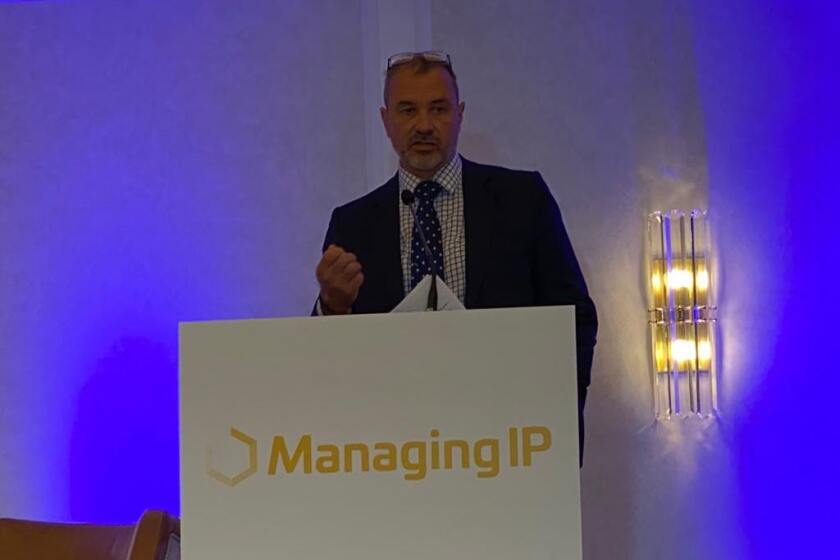The theme of day two of Managing IP’s Intellectual Property and Innovation Summit Europe in London last week was “preparing for the future”, with licensing negotiations in the internet of things, artificial intelligence in patents, and a digital-focused UKIPO all on the agenda.
But there were also plenty of throwbacks as well.
John Sideris, principal licensing counsel at Philips in New York, told attendees that anti-suit injunctions – all the rage in standard-essential patents (SEPs) disputes and an area where the extent of potential disruption is still largely unknown – could be traced back to 17th century maritime disputes but were thought to be only used for patents for the first time in 2012.
That came during a discussion on 5G licensing and the IoT, which touched upon how the rising trend of anti-suit injunctions might be reined in.
FRAND ‘nonsense’
Teo Taponen, senior director at InterDigital in Finland, said he hoped the “nonsense” of courts imposing successive anti-suit injunctions stopped soon and that instead of going to court parties should get together and agree to arbitrate.
Unless this happens, there is a risk of more uncertainty, said panellists.
Clemens Heusch, global head of dispute resolution at Nokia in Munich, said he suspected a reluctance to arbitrate came from the user side.
This is partly because the result might be hard to predict and so they may end up with a higher licence rate than they wished, and because agreeing to arbitrate de facto means agreeing to pay in 12 to 18 months.
Panellists were also asked to consider whether connectivity was becoming unnecessarily advanced and complex and should not be deployed much wider than traditional mobile phones.
Eduardo da Gama Camara Junior, partner at Dannemann Siemsen in Brazil, and moderating the session, asked whether technology had gone too far and whether sticking to the basics may be simpler.
Heusch of Nokia said there probably was limited need for fridges and toasters to be connected, but that if manufacturers were going to make that decision, they “would have to play by the [licensing] rules” for SEPs.
In an earlier discussion concerning fair, reasonable and non-discriminatory rates for SEPs, Linus Eklund, group director for patents at Volvo in Sweden, said it was up to regulators to determine the definition of discriminatory.
AI answers
During the conference, panellists spoke about AI patents and whether other IP rights such as copyright might be better suited to the technology.
Claire Bennett, general counsel at Five AI in the UK, said copyright was intended to protect creative artistic expression but that in the case of an AI invention an artistic creator would not be present, rendering protection difficult.
However, panellists agreed that, for now at least, the question of AI patent inventorship had been answered.
Matt Hervey, partner at Gowling WLG in London, said the DABUS cases showed that the world was “pretty much aligned” in its approach to not listing AI as inventor on a patent application.
He noted that a decision by a single judge at the Federal Court of Australia that accepted the application was later overturned by a full panel of judges at the same court earlier this year.
Although the application was granted in South Africa, the country lacks a substantive examination process and the filing has yet to be judicially tested, he added.
Tricks of the trade
Of course, any consideration of patent protection is not complete without also talking about trade secrets – and that was what counsel from Hitachi and biotech company Achilles Therapeutics discussed during the afternoon.
Liz Elmhirst, vice president for IP at Achilles in London, noted that just because something is a trade secret today does not mean it will be tomorrow. She said this was especially relevant for start-up companies, where trade secret protection is often favoured over patents because of cost.
Qinghong Xu, a partner at Lung Tin Intellectual Property Agent in China, offered a Chinese perspective on enforcement, where the bar to proving trade secret misappropriation is high.
“Chinese judges, in 57% of trade secret cases, decide that the confidential information is not actually a trade secret,” she said.
Trade secret owners may instead want to rely on breach of contract, which can be easier to enforce.
UKIPO vision
One person certainly looking to the future was the soon-to-be-departing UKIPO chief executive, Tim Moss, who gave the keynote speech.
Moss, who will leave his role in September, exclusively revealed that the UKIPO had cleared its backlog of patent applications for the first time in 15 years. The backlogs for trademark and design applications no longer exist either, he added.
In a speech that looked back over his five-year tenure, Moss talked about the enormous challenge of managing the conversion of around two million EU trademarks into UK-specific rights.
Moss also acknowledged that some of the UKIPO’s previous ways of operating, which were largely paper based, were not up to the standards expected and that work to transform the way the office works will continue.
Part of this will be a new IP application process ensuring customers have a single, integrated system with all services in one place, whether it’s for a patent, trademark or design, Moss said.
“Looking ahead – as I embrace a new challenge personally – I can assure you that our talented and dedicated team will continue in the work of building a truly world-class IP system for the UK,” he added.
Moss, unlike many others it seems, does not see the digital and connected future as a threat but more an opportunity. Only time will tell who is right.











